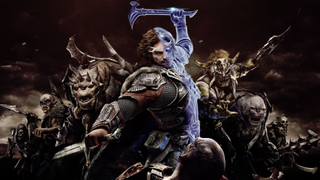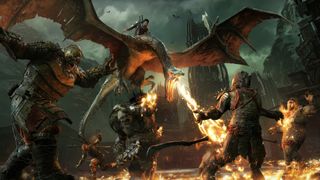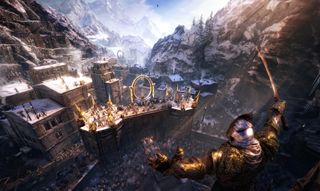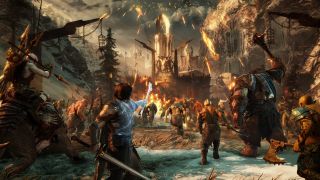Middle-earth: Shadow of War doubles down on the Nemesis system to astounding effect

The original Middle-earth: Shadow of Mordor has a lot going for it - the rich high fantasy of Lord of the Rings, a sprawling (if somewhat barren) open world, and satisfying Assassin's Creed-style gameplay that can swing from stealth to intense swordfighting in an instant. But by far its greatest achievement is the Nemesis system, where the named, randomly-generated orcs you encounter throughout Mordor grow in strength and status every time they've killed you. Over the course of the campaign, an early-game grunt can evolve into a hated (or respected) adversary. And in Middle-earth: Shadow of War, that ingenious system is effectively doubling its intricacy. The Uruk orcs don't just fight against you this time - some will also fight beside you as Followers. That bitter rival who's been smashing you to pieces could potentially become your disgraced subordinate, or - ideally - the best, most bloodthirsty friend you've ever made in Mordor.
Every great sequel needs a hook; the furthering of a bold, fresh idea put forth by the preceding game. For Shadow of War, that hook is the broadening of the Domination ability, used by our dual protagonists Talion, a Ranger seeking revenge for his slain family, and Celebrimbor, the ancient Elf phantasm he inadvertently fuses with. In Shadow of Mordor, dominating an orc or beast could effectively mind-control them into becoming your minions, who could then be used as plants in the orc hierarchy that might eventually come to your aid. Shadow of War expands Domination on a grand scale, putting Talion in command of an entire army of subservient orcs (and hulking war trolls called Olag-hai) who will follow you into battle, fight on your behalf, and die in your name if they have to.
Deciding to make some orcs your valued allies in Shadow of War stemmed from the unexpected fondness some players developed for their personal Nemesis in the first game - a sort of Batman and Joker dynamic between the player and an infamous orc who probably cut down the undying Talion dozens of times by the campaign's finale. "We would see people develop these relationships and these connections with their enemies, and they'd almost feel sad when they killed them," says Monolith's Michael de Plater. "So [we thought], how can we double down on that? How can we open up these new types of stories, and go further with creating those connections and relationships?"

There's a lot of emphasis being put on the new Nemesis Fortresses, but these are merely a means to an end, setting the stage for all the unforgettable, player-driven war stories that are just waiting to happen. Orcs finally have somewhere to call their home turf: giant, fortified castles that are instanced zones apart from Shadow of War's open-world sandbox (which de Plater says will be much larger and denser than the previous game). Nemesis Fortresses come with a built-in chain of command - an Overlord overseeing it all, and four Warchiefs in his liege - and their designs reflect the signature specialties of their ruler. In the case of the hands-off gameplay demo I'm viewing, this particular fire-obsessed troll Overlord wields the medieval fantasy version of a flamethrower, and thus his ramparts are dotted with cauldrons of boiling pitch and archers firing flame-tipped arrows.
Storming a Nemesis Fortress is as much about planning and preparation as your combat prowess once the bloodbath breaks out. As in the first game, you have the option to sneak a Follower into the Overlord's ranks as a ready-in-waiting mole, and the Followers you choose to join you in the charge adhere to a rock-paper-scissors balance of attributes, which will help or hurt your chances in accordance with the Fortress' defenses and its Overlord's traits. Once you've chosen your allies carefully and your forces are in place, all that's left to do is approach the Nemesis Fortress gates and steel yourself for a colossal conflict - one that feels a bit like the Battle of Helm's Deep if it were beholden to your personal choices and circumstances.
After an in-engine cinematic opening where Talion and his forces trade mean looks and taunting remarks with the Overlord's army, the onslaught begins. A great vignette of a troll Follower bashing through the gates like a living wrecking ball kicks off the conflict, the troll screaming out a battle cry as he grabs an enemy orc and squashes his head like he's juicing an orange. The rest of the ensuing fight resembles Lord of the Rings by way of Dynasty Warriors: widescale orc-on-orc violence breaks out on the ground level, and Talion can either slash his way through the fray or use his Celebrimbor-boosted acrobatics to vault up the fortress walls and take out key enemies and structures.

How intensely the battle rages depends on your approach and your choice of allies. "It's really down to the strengths and weaknesses of the various warchiefs and their followers," says de Plater. "I would say it's absolutely more about the named guys - the captains, and the warchiefs - then it is about the general grunts, but even there, you can bring more or less powerful troops." And you best choose wisely, because it's unlikely that Talion can single-handedly take down an entire army like Middle-earth Rambo.
Sign up to the GamesRadar+ Newsletter
Weekly digests, tales from the communities you love, and more
"It's theoretically possible, but we've got some pretty good players on our team, and they've not come close," laughs de Plater. "If you're facing multiple powerful warchiefs with effectively matched strengths and weaknesses, it can be really, really tough. We wanted to have that ceiling - because in some ways, the people who had the worst experience with Shadow of Mordor were the very best players. They didn't die, so they didn't get the best stories, and they were generally able to defeat most of the orcs without needing to adapt their strategy as much."
Of course, Talion and Celebrimbor are still here to layeth the smacketh down. Your suite of ghostly superpowers has greatly expanded in Shadow of War, on top of deeper RPG-esque customization complete with levels and interchangeable gear. Two spiffy new powers that are sure to ruin some poor orc's day are the ability to slow down time in the air to fire off a volley of shadowy arrows, and a projected strike where Celebrimbor stabs a faraway enemy and yanks his stunned body to your position. These new abilities might stem from the new Ring of Power we see Celebrimbor forging in Shadow of War's debut trailer - which won't likely end well, as you can probably imagine.

What's most impressive about the attack on the Nemesis Fortress isn't just the sense of scale - it's the many cinematic moments that seem to organically arise during battle. At one point, that same head-smashing war troll opens a gate to find a cannon pointing directly at his face; despite his earlier savagery, it's hard not to feel bad for the big lout as he writhes on the ground and eventually dies engulfed in flames. "If you're going against a really tough enemy, or someone has an ability that's the right match against your guy, there is going to be that danger [of your Followers dying]," says de Plater. "But even then, they can cheat death. [That troll] might not be gone - he might come back burned, scarred, and incredibly pissed off with you for putting him into that situation." Oh, and that flame cannon turns out to be a caged dragon that Talion frees from its prison and rides after a near-instant Domination, wreaking utter havoc across the battleground with its plumes of fiery breath. If every Nemesis Fortress fight is this intense, you might need to lie down every twenty minutes lest you start hyperventilating.
As the first game proved, even a beheading isn't always fatal for an orc - and that resilience is still a constant in Shadow of War. Early on in the assault, Talion clashes with a warchief with a new power - the ability to curse Talion's blade and prevent him from using any powers for a short time. The warchief is eventually executed in viciously brutal fashion; Talion's penchant for slicing his enemies in every gory way you can think of is another constant from the original. But the fight lasts long enough that the slain warchief has been resurrected - only to be killed once again in another stellar cinematic moment. That Follower who had infiltrated the Overlord's ranks does us a solid by sniping our adversary's arm clean off; you half expect/hope for Talion to give a vigorous thumbs-up to his loyal Follower for the life-saving support.
The conflict ends in the Overlord's stronghold, where another one of our Followers (who's strong against fire-type orcs and possibly Pokemon) performs another clutch assist to down the behemoth. Talion and Celebrimbor do the honors of ending the battle by forcefully crushing the Overlord's head with the base of their spectral standard, making the fortress their property in the process. From there, you have a choice to appoint a new Overlord to rule the castle in your stead; it only seemed fair that we promote the Caragor-riding orc spearman who helped us slay the final boss. The demo ends there, but its sheer sense of scale, mixed with the interplay between Followers and Nemeses, leaves the mind reeling with possibilities. It all feels like Mass Effect 2's Suicide Mission repeatedly unfolding with characters who are entirely your own, testing your Nemesis' mettle and your Followers' loyalty.

There's no way in hell that Talion will be boinking them, but Shadow of War's Followers seems like they leave just as much room for player investment and emotional attachment as a Mass Effect squadmate, provided you've fought alongside them enough times. That just leaves one question: whether or not these orcs and trolls are acting out of free will. "Domination [is akin to] a Jedi mind trick - it's not complete and absolute," says de Plater. "Orcs can be like humans - they're susceptible to being controlled by fear and power, but they do still have their free will in there as well. They can resist that, or break out of that, or rebel against that; we want it to be dynamic."
When it comes to how you handle your leather-skinned squad, you've got options. You can promote or demote your Followers as you see fit; you can choose the Shun option to cast out a disappointing ally mid-battle, and kill the former Follower where they stand. Maybe you'll anger a Follower by killing their kin in cold blood. But whatever the case, the orcs and trolls in Shadow of War seem like the beating heart giving life to a game world that'll generate unique and unforgettable player-specific stories.
"On the one hand, they are very driven by fear, and hatred, and anger - they're kind of these personifications of all these negative emotions and what happens when those things run riot," says de Plater. "But on the other hand, we go to a lot of effort to make them funny and have a lot of personality, and from their point of view, they enjoy their life in Mordor. So they're likeable, but they're also despicable. And I think that comes through whether they're your followers or whether they're your enemies." You'll get the chance to meet a Nemesis and Followers all your own when Middle-earth: Shadow of War launches for PS4, Xbox One, and PC on August 22, 2017.
Lucas Sullivan is the former US Managing Editor of GamesRadar+. Lucas spent seven years working for GR, starting as an Associate Editor in 2012 before climbing the ranks. He left us in 2019 to pursue a career path on the other side of the fence, joining 2K Games as a Global Content Manager. Lucas doesn't get to write about games like Borderlands and Mafia anymore, but he does get to help make and market them.
Most Popular


